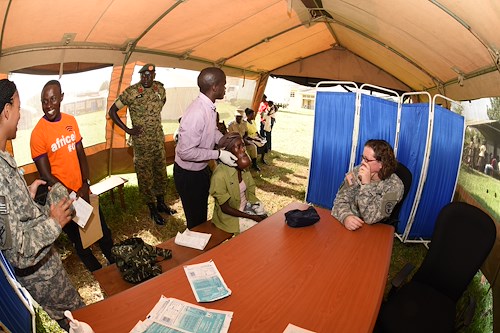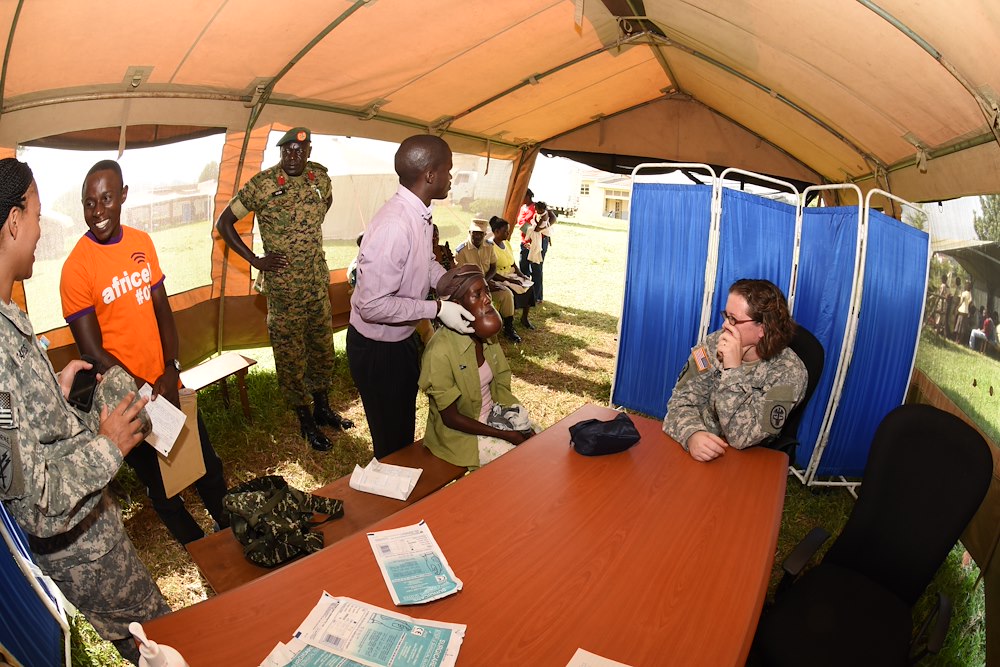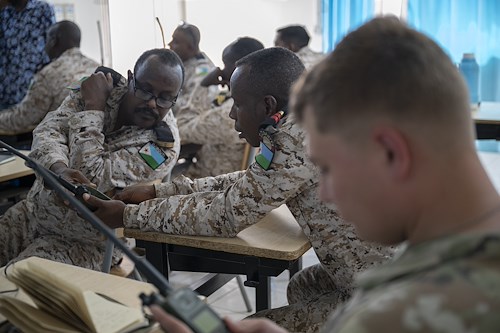Gallery contains 6 images
×
Photo 1 of 6
Combined Joint Task Force - Horn of Africa Image
Medical professionals from USARAF and UPDF attend to patients during MEDRETE 15-4 in Jinja, Uganda, September 21, 2015. This exercise focused on exchange of best practices strengthening U.S. strategic partnerships with UPDF to enhance readiness and interoperability. (U.S. Air Force photo by Master Sgt. Charlene M. Spade)
Photo by: Master Sgt. Charlene Spade
Photo 2 of 6
Combined Joint Task Force - Horn of Africa Image
A UPDF soldier briefs students from a local school on medical procedures during MEDRETE 15-4 on September 21, 2015 in Jinja, Uganda. This exercise focused on exchange of best practices strengthening U.S. strategic partnerships with UPDF to enhance readiness and interoperability. (U.S. Air Force photo by Master Sgt. Charlene M. Spade)
Photo by: Master Sgt. Charlene M. Spade
Photo 3 of 6
Combined Joint Task Force - Horn of Africa Image
Lt. Jarvis Amagara Muhairwe, ophthalmologist, examines a UPDF soldier during MEDRETE 15-4 on September 21, 2015 in Jinja, Uganda. This exercise focused on exchange of best practices strengthening U.S. strategic partnerships with UPDF to enhance readiness and interoperability. (U.S. Air Force photo by Master Sgt. Charlene M. Spade)
Photo by: Master Sgt. Charlene Spade
Photo 4 of 6
Combined Joint Task Force - Horn of Africa Image
SGT Michael Nguyen 404th CA BN, dental technician is guided by a UPDF dental technician while examining a patient during MEDRETE 15-4 on September 21, 2015 in Jinja, Uganda. This exercise focused on exchange of best practices strengthening U.S. strategic partnerships with UPDF to enhance readiness and interoperability. (U.S. Air Force photo by Master Sgt. Charlene M. Spade)
Photo by: Master Sgt. Charlene M. Spade
Photo 5 of 6
Combined Joint Task Force - Horn of Africa Image
CPT Serena Staples examines a UPDF soldier during MEDRETE 15-4 on September 21, 2015 in Jinja, Uganda. This exercise focused on exchange of best practices strengthening U.S. strategic partnerships with UPDF to enhance readiness and interoperability. (U.S. Air Force photo by Master Sgt. Charlene M. Spade)
Photo by: Master Sgt. Charlene Spade
Photo 6 of 6
Combined Joint Task Force - Horn of Africa Image
CAPT Roland Powers, CJTF-HOA task force surgeon observes as a doctor at Jinja Hospital examines a newborn during MEDRETE 15-4 on September 23, 2015 in Jinja, Uganda. This exercise focused on exchange of best practices strengthening U.S. strategic partnerships with UPDF to enhance readiness and interoperability. (U.S. Air Force photo by Master Sgt. Charlene M. Spade)
Photo by: Master Sgt. Charlene M. Spade
The Uganda Peoples Defense Forces recently hosted members from United States Army Africa Command and Combined Joint Task Force-Horn of Africa for MEDRETE 15-4 a joint medical readiness training exercise in Jinja, Uganda.
The purpose of the exercise was to pair UPDF doctors with U.S. medical counterparts to exchange best practices and enhance readiness. U.S. medical professionals were able to build relationships while evaluating UPDF capabilities and provide guidance and recommendations on clinical issues and expeditionary medical procedures.
“We all used what was available to develop a work around and options to ultimately manage multiple patient issues together, said Captain Roland Powers, Task Force Surgeon for CJTF-HOA. “We were able to work side by side and gain valuable interoperability and insights and can now better understand their capabilities and limitations.”
Powers said the combined collaborative efforts concentrated on tactical processes, with a larger focus on improving CJTF-HOA’s UPDF partners’ medical, medical support and medical sustainment capabilities, while also fostering the further development of the Profession of Arms.
More than 2,300 patients responded during this two week period. U.S. military and UPDF members had the opportunity to observe and provide 600 minor surgical and general practice procedures to patients.
Utilizing UPDF’s limited resources, the U.S. members adapted to provide patients with care; adopting techniques used when deployed to austere locations, where medical equipment and resources may be scarce.
“No matter what, we have to see things are done and then share what tools and knowledge we have, to get the work done,” Maj. Clare Ajulut, UPDF Combat Medic Training School commandant. “This training has been useful to avoid the time lag from point of care through evacuation and saving lives.”
MEDRETE 15-4 supported an U.S. Africa Command top priority by providing opportunities to ensure readiness training for medical combat operations. In addition, the UPDF enlisted medical soldiers were also given the opportunity to observe practices of U.S. subject matter experts in multiple medical specialty areas, from anesthesiology to dental and gynecology specialties.
UPDF soldier Sgt Olive Mumbejja, midwife, had the opportunity to observe Captain Powers attend to patients in the clinic. She said “he saw a few patients and things turned out well, they benefitted. I paid attention to his techniques and saw that there are some new things that the US does and we are able to grasp. It has been positive.”
The event was a mutually educational experience for U.S. medical personnel and UPDF participants. U.S. medical personnel encountered many tropical diseases not normally seen in their country.
“We did not have the luxury of technology and advanced materials like we do back home,” said U.S. Army Sgt. Michael Nguyen, 404th CA BN dental technician. It was humbling working with my UPDF teammates in helping the local population. Often times we forget that there is more than one way to address a problem.”
Another one of the main objectives for MEDRETE 15-4 was to provide U.S. and UPDF military personnel training in austere conditions. UPDF Col. Kenneth Ocen, physician, said that it doesn’t matter someone’s level of experience; there is always something new to learn, and the opportunity to build those relationships while doing so is invaluable.
“There is no time where you will stop learning,” said Ocen. “There is always a beginning, and the beginning is a teacher; that’s why we learn history and why we develop better after history. I think my colleagues were intrigued by a different type of practice, and I learned something from everyone on your team.”
The most valuable part of MEDRETEs for the U.S. is that it gives them the opportunity work with partners building professional relationships on a personal level.
“The ability for the Americans to see diseases, injuries and illnesses that they rarely see in the United States and learning to apply medicine without all of the technology that we’re so accustomed to back home is a great learning experience, as well, the ability to partner with one another and learn about each other and each other’s techniques while building relationships that will continue after we leave this place,” said Brigadier General Peter Corey, USARAF deputy commander.
UPDF Capt Timothy Myumbo, anesthesiologist said, “I must say the experience was Awesome. I think on both sides, the Americans and the Ugandans with them learning and seeing how we struggle through the limited resources we have compared with the multitude you do back home, so it’s a great learning experience that I think is priceless.”























